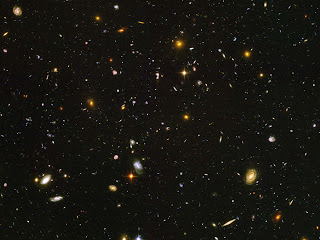
In my previous post, I mentioned some of the evidence supporting the idea that our universe began about fourteen billion years ago in an unimaginable burst of energy that subsequently became all the matter and energy in the universe. The occurrence of this event known as the Big Bang is so well established that it undergrids pretty much every aspect of modern astronomy, as well as much of modern geology and biology, although not quite as directly. The evidence is strong enough that even some of the leaders of the Intelligent Design movement, including Phillip Johnson and William Dembski, accept an old Earth and old universe, even as they try to undermine evolutionary theory. When there are multiple pieces of evidence from disparate sources that all point to the same thing, it makes a strong case that thing is true.
Throughout our individual and corporate history, we observe that everything that began has a cause. A city has its founder(s), a child the coming together of its parents, a tsunami has its earthquake, and an automobile the company that made it. We would be incredulous with a court that stated that there was no agent that caused a crime, a doctor that told us that the cause of our symptoms was those very symptoms, or an archeologist that claimed Stonehenge was built by the rocks themselves. So when we state that the universe began in the Big Bang, we are implying that there is also something that caused it to begin, something that is other than the universe itself.
This, of course, raises questions about the nature of that cause. Either it, too, had a beginning and therefore a cause in a chain going back to time immortal, or it must be something that has no beginning, which could be referred to as the first cause. The second option is preferable not only from Occam’s Razor, but that the nature of our universe implies its cause exists outside of space and time as we know it. The most distant galaxies are receding from us at a rate that would violate Einstein’s theory of relativity if the universe was expanding into pre-existing space; that and other considerations point to that the expansion of the universe itself is creating space. The theory of relativity also reveals to us that time and space are closely entwined, so it is unclear if time and space as we know them even existed before the Big Bang. Thus, the universe’s cause probably exists outside of time and space as we understand them, which would again imply the cause had no beginning.
This leads to another conundrum. How could an eternal, beginningless cause cause something to begin at a specific time? An unchanging, impersonal force will always be doing the same thing, so a timeless cause would seem to imply a timeless effect. The only way an eternal cause could lead to an effect in time would be something about that cause change—like a decision made—but that change would have to come from within the cause itself. That would imply that this cause has at least some characteristics of a person—we are capable of deciding to do one thing or another without always having an outside cause. So it appears that the universe’s cause has at least certain aspects of personhood, namely the ability to freely make decisions, like “I am going to create a universe today.”
Thus the fact of the Big Bang implies there is something more than the physical universe. It implies that there is something that caused it to come into existence. It further implies that this something must be self-existent (not have a cause), immaterial (all mater was created in the Big Bang), eternal, outside of space and time, and having at least some characteristics of personhood, such as the ability to make decisions. In other words, the universe has a Creator.
Image: Hubble Deep Field image reveals a large number of distant galaxies. (NASA)
No comments:
Post a Comment